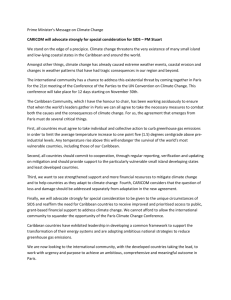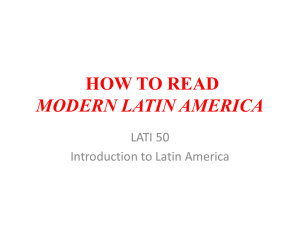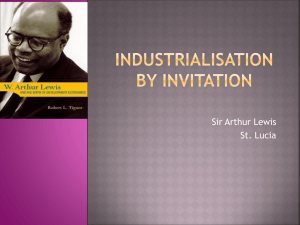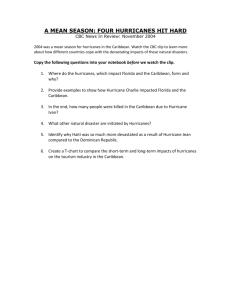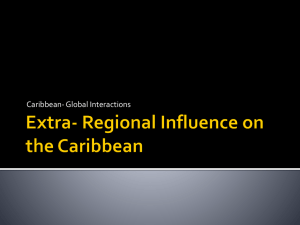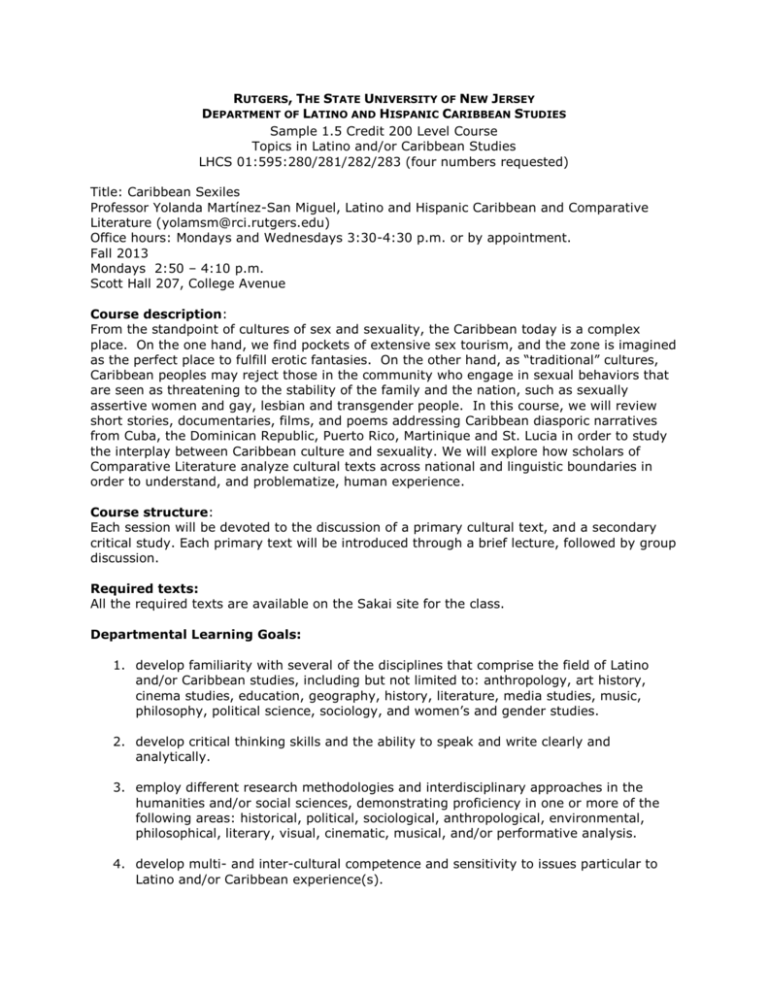
RUTGERS, THE STATE UNIVERSITY OF NEW JERSEY
DEPARTMENT OF LATINO AND HISPANIC CARIBBEAN STUDIES
Sample 1.5 Credit 200 Level Course
Topics in Latino and/or Caribbean Studies
LHCS 01:595:280/281/282/283 (four numbers requested)
Title: Caribbean Sexiles
Professor Yolanda Martínez-San Miguel, Latino and Hispanic Caribbean and Comparative
Literature (yolamsm@rci.rutgers.edu)
Office hours: Mondays and Wednesdays 3:30-4:30 p.m. or by appointment.
Fall 2013
Mondays 2:50 – 4:10 p.m.
Scott Hall 207, College Avenue
Course description:
From the standpoint of cultures of sex and sexuality, the Caribbean today is a complex
place. On the one hand, we find pockets of extensive sex tourism, and the zone is imagined
as the perfect place to fulfill erotic fantasies. On the other hand, as “traditional” cultures,
Caribbean peoples may reject those in the community who engage in sexual behaviors that
are seen as threatening to the stability of the family and the nation, such as sexually
assertive women and gay, lesbian and transgender people. In this course, we will review
short stories, documentaries, films, and poems addressing Caribbean diasporic narratives
from Cuba, the Dominican Republic, Puerto Rico, Martinique and St. Lucia in order to study
the interplay between Caribbean culture and sexuality. We will explore how scholars of
Comparative Literature analyze cultural texts across national and linguistic boundaries in
order to understand, and problematize, human experience.
Course structure:
Each session will be devoted to the discussion of a primary cultural text, and a secondary
critical study. Each primary text will be introduced through a brief lecture, followed by group
discussion.
Required texts:
All the required texts are available on the Sakai site for the class.
Departmental Learning Goals:
1. develop familiarity with several of the disciplines that comprise the field of Latino
and/or Caribbean studies, including but not limited to: anthropology, art history,
cinema studies, education, geography, history, literature, media studies, music,
philosophy, political science, sociology, and women’s and gender studies.
2. develop critical thinking skills and the ability to speak and write clearly and
analytically.
3. employ different research methodologies and interdisciplinary approaches in the
humanities and/or social sciences, demonstrating proficiency in one or more of the
following areas: historical, political, sociological, anthropological, environmental,
philosophical, literary, visual, cinematic, musical, and/or performative analysis.
4. develop multi- and inter-cultural competence and sensitivity to issues particular to
Latino and/or Caribbean experience(s).
5. conduct individual research to formulate rigorous and convincing arguments in the
field of Latino and/or Caribbean studies; honors students will perform and present
original research.
Course Learning goals:
1. The course will teach students how to approach studies of culture using an
interdisciplinary approach.
2. Students will become familiar with major debates and particular definitions of culture
that have been used in the articulation of Caribbean studies.
3. Students will learn writing skills, through essay exams written in class, workshops
conducted during class time to work on peer-editing of their essays, and by writing
and re-writing three short “reflexiones” on the primary texts analyzed in class.
4. The course will also cover a basic historical chronology for Caribbean from 1865 until
the present, as well as an overview of the constitution of Hispanic and Latino
communities in the United States from 1848 until today.
5. Students will learn about the links between migration and sexual identity in the
Caribbean.
6. Students will learn how to conduct historically grounded analysis of literary, visual
and performative cultural manifestations.
Evaluation:
Class Attendance and Participation
3 “reflexiones” or 2-3 page reaction papers
Midterm
Quizzes at the beginning of each class
Partial Exam on the day of the final exam
10%
30%
20%
20%
20%
Requirements:
1. Three brief “reflexiones” (1-2 pages, double spaced, typed). Each “reflexión” will be
a commentary of the main topic and discursive strategy developed in one of the
primary texts. If a rewrite is needed, the student must complete the revision of each
“reflexión” before the deadline for the next written exercise, or the rewrite will not be
graded. Rewrites will only be accepted if the first version of the essay was handed in
on time.
2. One in-class midterm.
3. One partial test will be administered as a final exam.
4. Quizzes on the assigned reading will be administered at the beginning of each class
(during the first 10 minutes). Arriving late will cause the student to miss the quiz.
No make-ups are offered for missed quizzes. Twelve quizzes of 10 points each will
be administered in class. Grade for quizzes is usually calculated using a curve that is
based on the highest score.
5. Attendance and participation are expected. Students should come to each class
having read the assigned texts and ready to participate in the discussion.
Participation will be graded based on attendance, active intervention in class,
quizzes, and preparation of short assignments that will be presented in class (such
as oral reports on some of the critical readings, as well as on some of the primary
literary and audiovisual materials studied in the course). Participation grade will be
lowered 10% after 3 absences with no medical excuse. Three late arrivals are
equivalent to one absence.
Students are expected to attend all classes; if you expect to miss one or two
classes,
please
use
the
University
absence
reporting
website
https://sims.rutgers.edu/ssra/ to indicate the date and reason for your
absence. An email is automatically sent to me.
Course Program:
Class #1
The Insular Caribbean: from sexual otherness to sex tourism
Review of syllabus.
Sexile, a definition.
Class #2: Foundational Narratives: First Sexiles: Heteroracial Erotics.
1948: Mayotte Capecia, I am a Martinican Woman
Natasha Tinsley, “At the River of the Washerwomen: Work, Water, and Sexual Fluidity in
Mayotte Capécia’s I am a Martinican Woman.” 139-168
Class #3: Foundational Narratives: First Sexiles: Feminine Perverse Desires
1956: Pedro Juan Soto, “The Captive”
Yolanda Martínez-San Miguel, “Female Sexiles?: Towards an Archeology of Displacement of
Sexual Minorities in the Caribbean” Signs. 36.4 (Summer 2011): 813-836. REFLEXION #1
Class #4: Foundational Narratives: First Sexiles: Queer Otherness
1960s: “Hum!”, Luis Rafael Sanchez,
Lawrence LaFountain-Stokes, “The Persecution of Difference,” Queer Ricans: Cultures and
Sexualities of the Diaspora, pp. 1-18.
Class #5: Homonationalism: Hidden Sexual Otherness
1970-1980s: Lourdes Casal, “The Founders”, “For Ana Veldford”;
Frances Negrón-Muntaner and Yolanda Martínez-San Miguel, “In Search of Lourdes Casal’s
‘Ana Velford.’” Social Text 92 (Fall 2007): 57-84.
Class #6: Sex and Politics in Cuba
1980s-1990s: Reinaldo Arenas, Before Night Falls (film) and selection from autobiography
of same title.
Class #7: MIDTERM
Class #8: Boricua Lesbian Sexiles
1990s: Frances Negrón Muntaner, Brincando el charco (1995)
Frances Negron-Muntaner, “When I was a Puerto Rican Lesbian”
Class #9: Beyond the mother’s desire
1990: Jamaica Kincaid, Lucy
Kristen Mahlis, “Gender and Exile: Jamaica Kincaid’s Lucy” Modern Fiction Studies 44.1
(1998): 164-183. REFLEXION #2
Class #10: Masculinities in crisis: the Dominican tíguere
1995: Junot Díaz, “Drown,” “Aurora”, “How to Date…”
Marisel Moreno, “Debunking Myths, Destabilizing Identities: A Reading of Junot Díaz’s “How
to Date a Browngirl, Blackgirl, Whitegirl, or Halfie”
Class #11: Cubanness and Homonationalism
1997-2000: Sonia Rivera Valdés, “Five Windows on the Same Side”, “Lunacy”
Emilio Bejel, Chapter 12, Gay Cuban Nation.
Class # 12: Sex, Tourism and Migration
2005: Documentary: Princesas.
Amalia Cabezas, Economies of Desire: Sex and Tourism in Cuba and the Dominican
Republic, Introduction, Chapter 5.
Class #13: Sexuality, Gender and Social Media
2003: Juana María Rodriguez “Welcome to the Global Stage”
2011: Cooking with Drag Queens: How to Make Tostones
(http://www.youtube.com/watch?v=TA05Vl3FoV0)
REFLEXION #3
Class #14: Beyond the Caribbean Sexile
2010: Erika López, The Girl Must Die, selection
Lawrence LaFountain Stokes, “Erika López TransAmerican Road Trip: From Philadelphia to
San Francisco,” Queer Ricans.
Second partial exam will be administered on the day assigned by the registrar for the final
exam.




